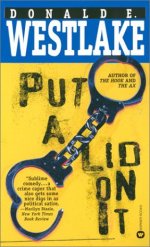
Put a Lid on it
Donald E. Westlake
278 pages
published in 2002
So far, of Donald E. Westlake's novels, I've only read several of his Dortmunder books, e.g. Good Behavior. This changed with Put a Lid on it, which is a standalone novel, though with much of the feeling of a Dortmunder novel, and the same wry humour.
Certainly the hero, Francis Meehan, caught while attempting to steal a US postal service truck he thought held computer parts, is an even more unlucky criminal than Dortmunder. Thanks to his botched robbery, he is now looking to a loong stretch in a federal prison, rather than the "cozy" New York state prisons he was used to. Lucky for him then that Pat Jeffords, a highly placed political advisor to the current president has a little job for him: recover an embarassing videotape from the president's opponent in trade for his freedom...
Meehan may be unlucky, he ain't stupid and he takes his own precautions to avoid being screwed over at the end of the deal. He contacts the lawyer the state had gotten him for his trial to represent him to his "employers" and also plans to make a bit of money on the side by not just stealing the videotape, but also the very valuable firearm collection it is housed with...
All very sensible, but Meehan quickly finds out he needs to worry less about deliberate betrayals by his employers as he has to about their tendency not to be able to keep a secret, to not "put a lid on it", so to speak.
There's the usual Westlake humour here, which is situation based: the characters are all deadly serious, it's the situations Westlake puts them in that are funny. In Put a Lid on it, Westlake also gets much mileage from milking the differences and similarities between the world of the professional criminal and politics. To give a flavour of the novel, I'll leave you with the following quote, too good not to show in full:
Meehan had noticed over the years that crooks in stories and movies always make all kinds of plans, contingencies, maps, timetables, charts, maybe even scale models of things. He'd also noticed over the years that he himself and the guys he knew never did any of that, wouldn't have the first idea how to go about it. You work up a general idea of what you want and how you think you might want to go about it, and then when you get there you improvise, based on the situation, which is never exactly, precisely what you thought the situation was going to be.
That's the way it had always worked with him and the guys he'd met along the way, though he could see sometimes that those careful plans had a lot to be said for them. Like as though you were building a house, you'd certainly want that plan, but in fact they never were building a house. Robbing a house is a different kind of thing.
Also, people who make plans in their lives and people who make robberies are two pretty distinctive character types. People who make plans are likely to make plans that eliminate the necessity of having to make a robbery in the first place. So Meehan and company, not being planners, would just get a general idea, knock back a little bourbon right before the job to calm the nerves, and invent to suit once the job got under way.
Quote nicked from Outside of a dog.
